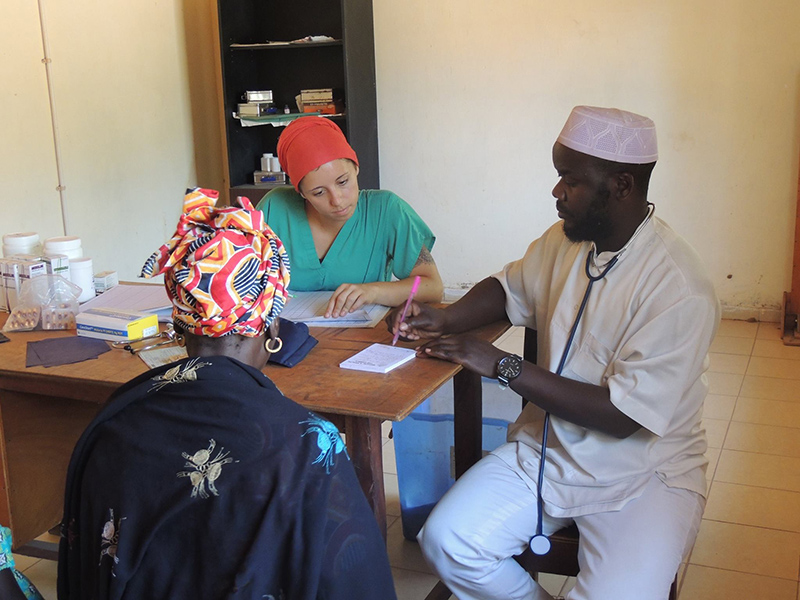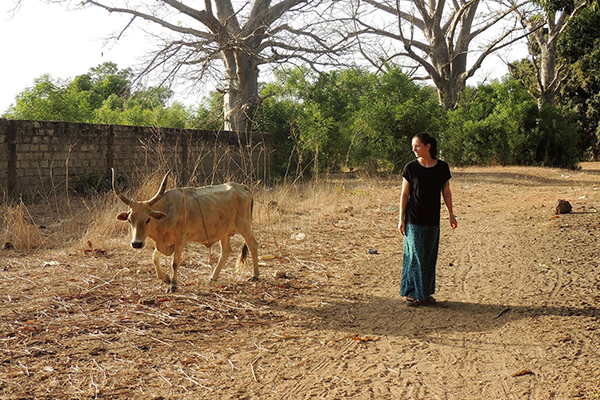Chemistry Major Provides Medical Care and Nutrition in the Gambia
By Kylie Gray
November 8, 2017
It was 4 a.m. when Victoria Smith stepped off the plane in Banjul, the capital city of the Gambia. The lights in the terminal flickered and then shut off completely. Two minutes of complete darkness passed before the generator kicked on.
Over the next six months, the Drexel junior would grow accustomed to the sudden power outages while on co-op as a nurse’s assistant at Bwaim General Hospital, a facility that operates without electricity for eight to nine hours per day.
Scrubbing In
Smith’s position at the hospital was organized by Power Up Gambia, a Philadelphia-based NGO that helps to provide reliable electricity and water to the Gambia’s health facilities. Though previous Drexel co-ops had worked on maintaining and repairing the hospital’s solar equipment, Smith — a chemistry major and biology minor with plans to enter medical school — chose to focus on medical care.
 Smith at a health outpost with a member of the reproductive and child health team
Smith at a health outpost with a member of the reproductive and child health team
Her assignment in Bwaim — a small town where home addresses, health insurance and personal vehicles are scarce — offered a starkly different view of health care from her previous co-op experience at the Children’s Hospital of Philadelphia. Two weeks after arriving, she inserted her first IV. She wrote prescriptions and administered injections with help from the nurses, and spent time working in each of the hospital wards: outpatient, surgical (for wound dressing), medical, maternity and malnutrition. About once per week, she accompanied hospital staff to the less-accessible villages to deliver needed medication, vaccinations and supplies for young children.
“I was excited that the nurses trusted me enough to let me do so much, but it came with a lot of responsibility,” Smith says. “It’s not something that I took lightly. I always double and triple checked everything.”
Smith says that the hospital had about six hours of electricity per day, but it was unpredictable and usually off during the daytime. Solar panels from Power Up Gambia provided two to three extra hours of electricity each day, but the batteries were nearly eight-years old and unreliable.
“There are lots of things you can’t do without electricity, like take X-rays or run oxygen concentrators to provide oxygen,” says Smith. “That was always the saddest part. It was frustrating because hospital staff want to give the best care they can, and then the lights go off.”
Because of the power issues, the hospital had recently stopped performing surgeries, despite being one of the largest hospitals in the country. Smith often had to accompany patients on the two-hour journey to Banjul for critical care.
Finding Her Roots
Though Smith found her work as a nurse’s assistant instructive and rewarding, she felt she could do more to help the hospital community.
“I realized that, while my volunteering in the wards was appreciated, the amount of people I could impact this way was limited,” she says. “I was yearning to find a way I could continue to help the patient population at the hospital even after my co-op was over and I was back in Philadelphia.”
That opportunity came in the form of a garden that hospital staff had long hoped to implement.
“Malnutrition is a big problem in the Gambia,” Smith says. “There is a lot of protein deficiency and anemia. The goal was for the hospital to be able to provide fresh fruits and vegetables to patients.”
 Smith during her second week in Bwaim
Smith during her second week in Bwaim
Smith became project leader for a 60-by-90-meter garden, from constructing the space to planning what it would produce. She was careful to choose crops that were uncommon or harder to grow, so as not to compete with local families who sold produce at markets. She used online platforms to fundraise $1,400 from family and friends back home.
Though raising the funds was relatively straightforward, finding a way to keep the hospital’s more than 25 free-range goats (or “little Houdinis,” as Smith calls them) out of the garden was another story. Smith contracted the hospital maintenance crew to help her dig a perimeter ditch and wire down a fence in concrete. Her hands-on approach surprised some of the crew.
“It was interesting as a female, because women have a different place in the culture,” she says. “I would be digging a ditch and someone would ask when I would be making lunch. But I wasn’t going to make lunch — I was going to keep digging.”
Gathering materials provided another roadblock, as she was often quoted a “foreigner price,” about a third more expensive. Knowing that negotiating is a way of life there, Smith gathered some pricing information from a Gambian friend and set out to make the most of the $1,400. She got a price list from 15 different building supply stores and, bluffing her knowledge of construction, bartered for the best prices on wheelbarrows, watering hoses, rakes, shovels, watering cans and more.
It was a huge undertaking for the chemistry major, who says she had never managed a project so large, or with so many working parts.
“The most important things I gained from the experience are management and leadership skills,” Smith says. “As the only person leading this project, the outcome depended entirely on my ability and drive to make it succeed.”
By the time Smith left Bwaim in September, she and the hospital staff had installed three water spigots, tilled the land, and begun planting — banana, avocado, orange, lime, moringa, cucumber and squash. The hospital appointed three gardeners to bring the saplings to fruition.
“In the long run, I hope the project will make a lasting impact on what is available to eat. It may also free up money in the hospital’s budget for other initiatives,” Smith says.
The mathematical and analytical skills Smith used in her project — from estimating quantities of cement to plotting the garden’s perimeter — will prove useful as she prepares for the MCAT exam in April. Her interest in math was one reason she chose chemistry as her major, with the ultimate goal of becoming a surgeon.
“I would absolutely recommend chemistry as a pre-med path,” Smith says. “Chemistry is a problem-based major. Studying for the MCAT, I’ve already noticed that those problem-solving skills are really useful.”